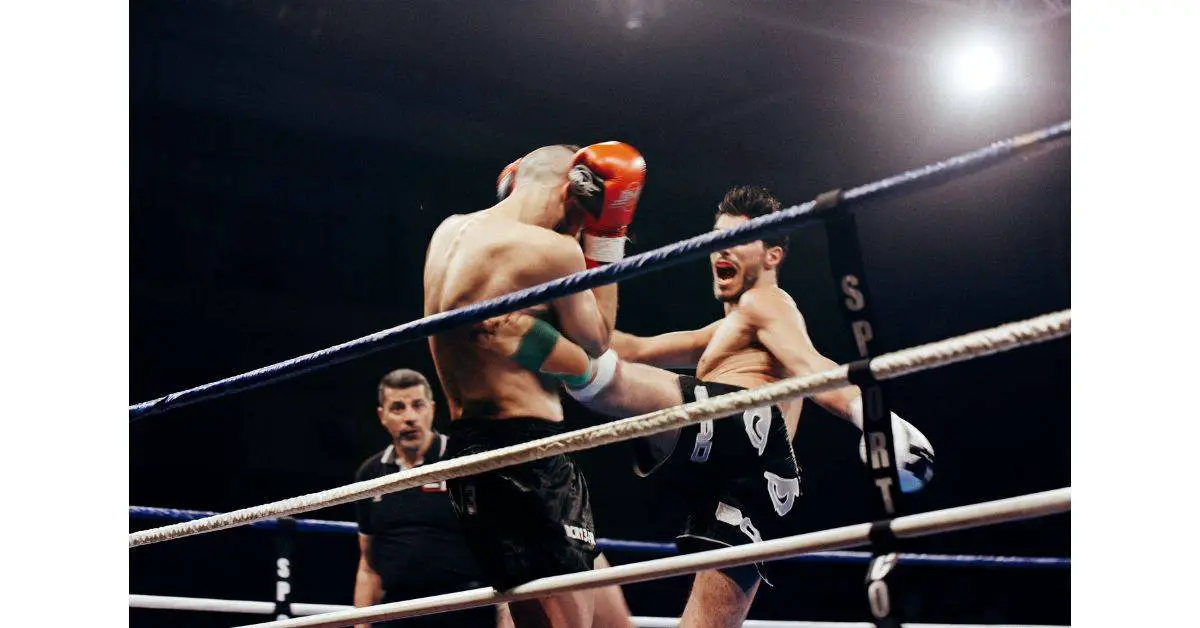Learning to fight can be the best thing you do for yourself. Not only will it give you confidence and strengthen the bond with yourself, but it’ll also teach you valuable skills you can use in your life. A way most people use to learn to fight is sparring.
Participating in a spar—will give you the closest experience to a real fight in training. You’ll experience the feelings you’ll have while in an actual self-defense situation. Therefore, it prepares you for such a situation in the best way possible. Likewise, it will make you mentally tougher.
Other than that, sparring gives you plenty of mental and physical benefits. For instance, you’ll constantly be moving around, thus, improving your physical shape.
Fighting and martial arts will increase your physical self. So, sparring, also a highly effective workout, will help you achieve such results in less time. Thus, participating in it—will give you such benefits.
This article will present nine benefits you’ll experience if you spar more often. Likewise, it’ll motivate you to take what you want and try to achieve it. So, without further ado, let’s dive in.
Before we dive in, however, if you want to read tips and tricks that’ll help you win more spars, follow the link to an article of mine on the topic.
#9 – Improves your defensive and offensive skills
The first benefit we’ll discuss is one I believe most people who read this article will want to read. Now, while you can achieve the same result in other ways, sparring is best.
Sparring will improve your defensive and offensive fighting skills. It’s essentially the best way to learn to fight, as it gives you the closest experience to a real fight you’ll get in training.
Sometimes, all you need to do is participate in a few spars to skyrocket your skills.
You’ll learn how to move around your opponent, stay active while fighting, create angles to attack the opponent, and receive a hit and not even blink (we’ll also discuss the blinking reflex later in this article, so stick around.)
To become a solid fighter, you must spar once in a while. There’s a limit to how much you can progress without fighting. Thus, if one of your goals is to progress as much or as fast as possible, you must often spar (we’ll examine how often you should spar in the final part of this article.)
#8 – Betters confidence
Our results highlight the effectiveness of self-management to enhance Korean martial arts practitioners’ exercise self-confidence, commitment, and satisfaction, findings that may potentially be extended internationally and to other types of sports.
SOURCE
I wanted to start by quoting this study, examining the effects of self-management on practitioners’ self-confidence and satisfaction. So, if we can pinpoint self-management, we’ll be capable of doing the same things and, thus, experience the same results.
But before we do that, let’s see why sparring will increase your self-confidence.
Imagine fighting against someone you appreciate and coming out on top. How would you feel? I feel magnificent and fulfilled when I’m capable of winning a spar.

Now, the opposite applies as well. If you improve after every spar, even if you lose, you’ll appreciate yourself more often. Therefore, your self-confidence will increase with how much you allow yourself to learn through fighting.
Now, let’s get back to the study. What is self-management? According to the survey, it is “People’s capacity to effectively monitor, control, and manage thoughts, emotions, and behaviors that could facilitate goal accomplishment.”
You still might ask yourself how that relates to sparring. Well, to put it simply, it gives you the platform to self-manage your emotions, thoughts, and behaviors. If you can successfully stay calm while in a spar, your self-confidence will also improve.
#7 – Enhances physical shape
Now that we know that sparring will lead to higher confidence and a faster progression rate, let’s go over the following benefit: enhanced physical shape.
Today, being in better shape is a highly desirable trait. It’s something people lust for. People would do anything to be in shape for the rest of their lives. However, few are those who would invest daily efforts to see results in the long term.
Sparring gives you a platform to improve your physical shape. You’ll burn plenty of calories while in it, using all of your body to stay active. Likewise, it’s an exercise that will improve your heart rate and, thus, help you lose body fat if that’s one of your goals.

Specifically, a boxing trainee who weighs 160 lbs (72kg) can burn up to 600 calories per hour only from sparring! In addition, you burn more calories in spars than you do while training the heavy bag. As a result, it’s a highly effective workout.
If you want to know which martial arts are best for fitness, follow the link!
#6 – Prevents flinching (blinking reflex)
Have you ever got punched in the face? Of course, your answer will be yes if you either sparred or fought someone for real. However, for those of you who haven’t, how do you think you would react to a punch in the face? I’ll tell you how; you’ll blink and look away, as it’s our natural reflex.
However, this flinching reflex can sometimes harm your fighting game, as it’ll force you to look away. This has a much more significant effect than you think. Disconnecting from the fight for even a second can lead you to get punched one more time.
As a result, we need to work on preventing this blinking reflex from showing in your game. So, what’s the best way you can do that?

Sparring is the best way to prevent the blinking reflex from occurring when you fight. While it’s a natural defensive reflex, it can cause more harm than good when fighting, even in real life. Start by having someone punch you in the face lightly (while wearing headgear!), and try not to look away or blink.
You can amp up the pace once you feel ready.
To spar, you must protect your head at all costs. I wrote an article on the best boxing headgear you must have to ensure the short and long-term health of your brain and head; do follow the link to see which they are.
#5 – Improves mental toughness
Martial arts will make you mentally tough. But what specific training routine will make you the toughest? You can punch a heavy bag all day and learn to fight that way. However, you won’t know how to react when you encounter a real fight, as you now have a moving opponent.
Sparring is the best way to become mentally tough, especially if you do it often. It simulates a real fight, which is a scary experience for most people. Likewise, it’ll test your physical and mental limits, pushing them further than you ever thought possible.
This, as you can guess, will make you mentally stronger. It’ll give you perspective on what you thought were your limits. Consequently, it’ll also provide various reality checks and give you a few slaps in the face (no pun intended.)
If becoming mentally tough is your goal, it’ll be best to spar more often. Just imagine how scary it is to face someone bigger, stronger, and more experienced than you in an honest, hard spar. How would you feel?
These feelings will help you deal with challenging situations later in life. Hence, sparring more often will make you deal with complex situations in life better.
The following benefit is also related to this topic, so let’s see what it is.
#4 – Reduces stress and aggression levels
Today’s society embraces stress and being in a rush all the time. We seem to have gotten accustomed to this situation. But it’s sometimes best to stop and think without any worries and pressure.
Martial arts will help you do just that. Training in boxing, for example, will be a platform for you to release built tension and aggression.
Let’s assume, for example, that you have had a tough day. You might have gotten a bad grade or had someone hurt you – it doesn’t matter; we all feel bad sometimes.
Then, you go to your boxing class and start hitting the heavy bag or even sparring. Then, you go all-in on a sparring session and end up winning. Wouldn’t you feel less stressed?
Martial arts apprentices turned out to present a statistically significantly lower level of hostility and of the general aggression index than combat sports athletes.
SOURCE

The regular practice of martial arts could elevate mindfulness levels of practitioners and thus influence positively on stress management and therefore quality of life and well-being.
SOURCE
These two studies give up perspective and prove my point in this section. You will be more mindful, making you less stressed. Thus, increasing your quality of life and well-being.
Likewise, you’ll be less hostile than the average person, contrary to common sense. However, the opposite seems to apply; once you take all that aggression and stress out in a boxing class, you’ll also be less stressed and aggressive toward others.
Doesn’t that excite you to start sparring already?
#3 – Teaches you more about fighting than typical training
Fighting can be scary. However, most people would want to learn self-defense, so they could defend themselves and their close ones if they need to.
To do so, you must gain experience through actual fighting. Now, it’ll be best if you stay away from actual fighting, as it might get you in deep trouble.
Sparring will give you the closest experience to combat in training. Likewise, you’re not as likely to get hurt in a spar, as you can always say stop and end the fight.
But typical training, such as heavy bag training, will teach you how to fight. But, it won’t give you any fighting experience; the best way to get that experience is through fighting, primarily sparring.
Follow the link if you want to increase your punching power. Although increasing your punching power is challenging, the article the link leads to will tell you how to do so.
#2 – It’s the best way to prepare for competitions
What’s the best way to prepare for a competition? You may have a tournament coming up, or maybe you want to progress as fast as possible. In that case, you want the closest experience to what you’re preparing for.
Sparring best simulates competitions, as it’s you against someone else. Likewise, it’ll help you get used to the mental situations you’ll face there, such as facing someone better than you. These will all help set you up for success in the competition itself.
If there’s one thing I learned in the military it is that the way you train will also be the way you fight.
#1 – Grows self-esteem
Visual inspection showed that four participants improved their global self-esteem. Self-efficacy was improved in three participants whereas the other two had high self-efficacy before participation in the karate program.
SOURCE
Improving your self-esteem, in my opinion, is the best thing you can get from sparring. Martial arts, such as boxing, MMA, and judo, will give you a sense that you can do anything.
Sometimes, the way you perceive yourself will hurt your performance. Thus, increasing how you view yourself is the key to boosting your performance and sense of capability.
I highly recommend making viewing yourself as capable of anything – a priority. It has helped me throughout my entire life, from opening this website to learning Muay Thai and boxing.
Sparring will give you better self-esteem. And thus, it’ll help if you don’t avoid it, although it sometimes can be scary.
How often should I spar?
Limiting your training will help you avoid overtraining. Overtraining can cause severe damage in both the short and long-term of your workout. As a result, it’ll be best to limit the number of times you spar. So, how often should you do it?
It’ll be best if you spar hard once a week and lightly whenever possible. If you feel incapable of going hard in a spar, don’t push your limits too much. Instead, focus on recovery and rest to ensure you won’t experience any injuries. You can spar lightly whenever you want, as you’re unlikely to hurt yourself.
It’s not uncommon to see boxing trainees spar too often. Their bodies must get used to the overload over time. So, if you jump into the fighting session without preparation, which can sometimes take months, you’ll be more likely to hurt yourself.
Symptoms and warning signs of overtraining
- Unusual muscle soreness after a workout, which persists with continued training.
- Inability to train or compete at a previously manageable level.
- “Heavy” leg muscles, even at lower exercise intensities.
- Delays in recovery from training.
- Performance plateaus or declines.
As you can see, it’ll be best to avoid these symptoms as much as possible, as they can severely hurt your life.
Should I spar as a beginner?
When you’re just starting any martial art, even boxing, it’ll be best to stay away from heavy training until you feel comfortable. While it’ll be different for everyone, waiting a few months before you spar will be critical in ensuring a healthy progression.
It’ll be best to avoid sparring until you have trained for about 4-8 months. Then, sparring as a beginner won’t be as effective as when you’re experienced. Likewise, you’ll also be more likely to experience some injury when you don’t know how to defend yourself properly, such as when you’re a beginner.
You don’t know how to defend or attack properly when you’re a beginner. Now, that all makes sense when you read it. However, you’ll want to start sparring once you’re in the boxing gym and see everyone do it.
But you must stay strong and keep your body as healthy as possible.
Eventually, it’ll be best to avoid these actions now instead of regretting them later.
Which is better, light or hard sparring?
As we discussed thus far, it’ll be best if you keep your body as healthy as possible. But, on the other hand, you don’t want to push its limits too much, as that’ll only cause damage in the long term. So, let’s see which type of sparring you should do, light or stiff.
Both light and hard sparring provide unique benefits; thus, combining both in your training routine will be critical in maximizing your progression. However, it’ll be best to hard spar up to once a week, as it can seriously hurt you, especially when starting.
A light spar is when you’re not using full force; instead, using taps. Now, you can do it more often and ensure you’re not causing any damage. Likewise, it’ll help you hone your boxing and fighting skills.
A hard spar, on the other hand, is more mentally developing. Of course, if you participate in one, you’ll feel pain, as the opponent won’t go easy on you. But, eventually, it’s the closest you’ll get to a real fight, so make sure to enjoy the experience and improve after it.
Is sparring necessary?
Many martial arts trainees, such as boxers, avoid sparring altogether. The act might scare them, or they may even feel unready. So it’s vital to avoid it until you feel comfortable with the fighting style you’re learning. Now, let’s see whether it’s necessary to spar.
Sparring is unnecessary for progressing or learning to fight. You can, for example, learn to box, MMA, BJJ, and even karate without it. However, sparring will help you progress much faster than your peers, as it provides the most realistic fighting experience. It’s the closest you’ll get to a real fight in training.
Indeed, you don’t have to spar to feel the benefits of the training you’re participating in. You can, for instance, keep training on the heavy bag and still hone your punching technique.
However, there’s no better way to learn self-defense than to spar more often. So, before you skip doing it altogether, think about whether you’re going easy on yourself or are not ready yet.
Final words
I love the act of sparring. I believe it’s the best way to progress and learn to fight, as it’s the closest you’ll get to a real fight.
Likewise, you can even do light sparring, which doesn’t hurt nearly as much as going full force. Nevertheless, its benefits are plenty; thus, it’ll be best not to avoid it even when you’re most scared.
Follow the link to read about the best clothing for sparring and training. Buying these pieces of clothing will help you be more comfortable and perform better while sparring.

